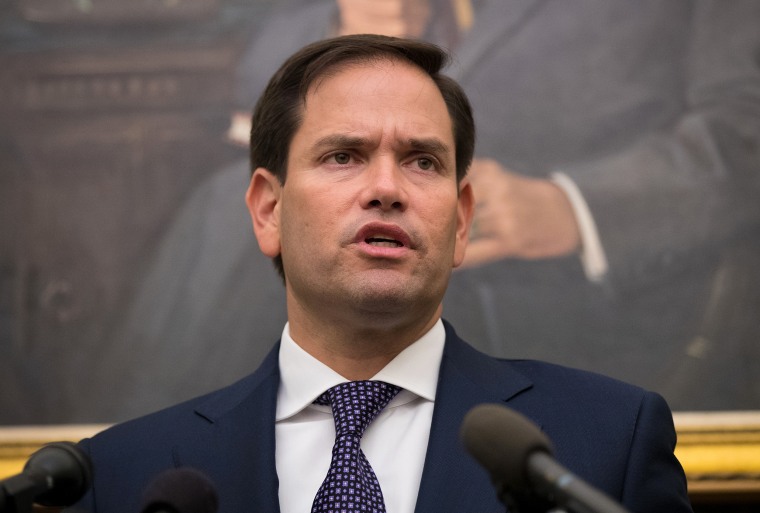WASHINGTON — Just days before an expected vote, the sweeping Republican tax bill's fate was up in the air Thursday, with few details confirmed and key senators withholding support unless changes were made.
Sen. Marco Rubio, R-Fla., announced he would oppose the bill unless it expanded a child tax credit to millions of lower income families by making a larger portion refundable against payroll taxes.
"I want to support tax reform and it's important for the country, but I think this needs to be part of it," Rubio told reporters.
The Senate bill that passed includes a $2,000 child tax credit (CTC), but only a maximum of $1,100 is refundable, making much of the credit inaccessible to middle- and lower-income families. Rubio introduced an amendment that would make a larger portion refundable and pay for it by lowering the corporate tax rate to 20.94 percent instead of 20 percent, but it failed.
"Unless they can figure out a way to add to the $1,100 figure, I won't support the bill," Rubio said.
He added that he was upset that an emerging deal between the House and Senate on taxes is expected to raise the corporate tax rate to 21 percent as he proposed, but use the savings to help finance further tax cuts for the rich by lowering the top tax rate to 37 percent.
President Donald Trump said Thursday that he believed Rubio would eventually get to yes.
"I think he’ll get there. He's really been a great guy, very supportive," Trump said. “I think that Senator Rubio will be there, very shortly."
Sen. Mike Lee, R-Utah, who has partnered with Rubio on the issue, is also "undecided" on the bill, his spokesman Conn Carroll confirmed to NBC News. "Senator Lee continues to work to make the CTC as beneficial as possible to American working families," Carroll said.
Republicans can only afford to lose two votes, and Sen. Bob Corker, R-Tenn., is likely to oppose the final version over deficit concerns. Every Democrat is expected to vote against the tax bill.
Senate Majority Whip John Cornyn, R-Texas, has set a goal of voting Tuesday on a final deal. But no bill has been released and information on key features are scarce. Expected provisions include the lower 37 percent top tax rate, a 21 percent corporate tax rate, and a compromise on the State and Local Tax Deduction that would cap it at $10,000 in combined taxes.
But huge questions remained as of Thursday afternoon: How many tax brackets would there be and where would the income thresholds be set? How would new benefits, like the lower top rate, be financed? Which provisions would be permanent and which ones would expire? Which ones would be immediate and which ones would phase in and out over time?
"If you just add up the things we know, it seems they're pushing in the direction of more cost," Marc Goldwein, senior vice president for the Committee for a Responsible Federal Budget, which advocates for fiscal discipline. "But here’s what else we know: They’re only allowed to have it cost $1.5 trillion. There must be offsets somewhere."
Democrats have excoriated the House and Senate bills over their cost as well as nonpartisan analyses showing its benefits would primarily go to high-income households and corporations.
"Some middle-class family may see very minor tax cuts at the beginning," Sen. Richard Blumenthal of Conecticut said on MSNBC. "But the big benefits and breaks and giveaways are to the wealthiest and the big corporations, and frankly, at the expense of our children and grandchildren, because they’re going to be burdened with trillions of dollars in debt."
Pressure is high to complete a deal in the next week, before newly elected Democrat Doug Jones of Alabama replaces Republican Sen. Luther Strange, which would narrow their margin of error to one.
Sens. John McCain, R-Ariz., and Thad Cochran, R-Miss., have both missed recent votes with health issues, which could also complicate the timing. A spokesman for Cochran said he was in Washington this week and available for votes, while a spokesman for McCain said Wednesday that the senator "looks forward to returning to work as soon as possible."

